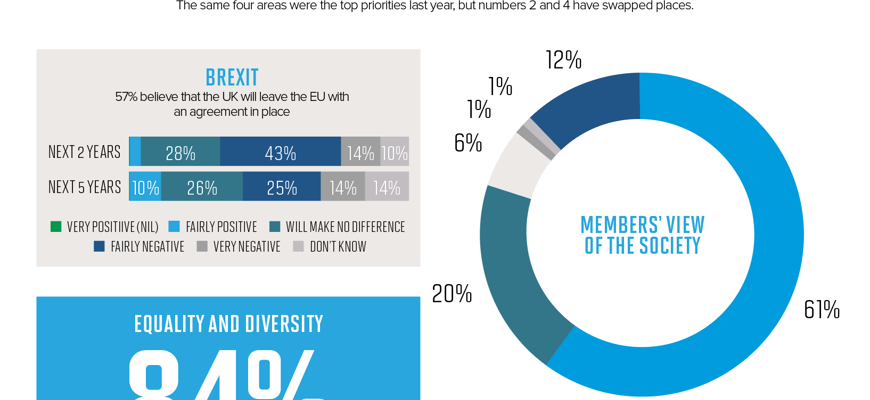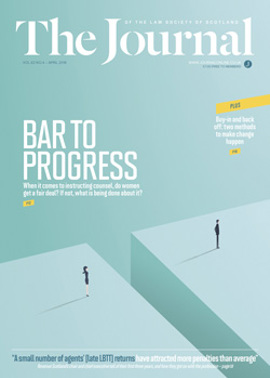Our survey said...

The latest survey of Scottish solicitors has revealed that the majority are optimistic about the future of the legal profession, despite more than half of respondents having concerns about current Government policy on legal aid and the UK’s vote to leave the EU.
Society President Graham Matthews observed: “In many respects our members’ views are consistent with previous years.
“Scottish solicitors continue to show concern about the potential impact of Brexit, access to justice issues and the future regulation of legal services, which in turn will continue to drive and inform much of our policy and engagement work.”
Regulation matters
Once again, Scottish solicitors have said that regulation is the Society’s core function, with 84% of respondents saying that “intervening in firms where a critical failure has been identified” should be high priority for the Society.
The vast majority of respondents, at 91%, said that the Society is an effective regulator, a result which is up 6% on last year’s findings.
And echoing previous years’ results, regulatory duties including setting standards and updating practice rules (78%), investigating conduct complaints and prosecuting cases before the Scottish Solicitors’ Discipline Tribunal (66%) and inspecting firms to ensure compliance with the accounting rules (66%) also ranked as high priority.
These results are particularly pertinent in the context of the Scottish Government’s independent review of the regulation of legal services.
Esther Roberton, chair of NHS 24 (and featured at Journal, March 2018, 12), is leading the review which will report to Scottish ministers by August 2018, making recommendations to reform and modernise the framework for the regulation of legal services in Scotland.
In a detailed submission to the review earlier this year, the Society set out its own recommendations for reforms, which address the challenges of modern legal practice and put consumer protection at its core.
Matthews commented: “We have long argued the case for a regulatory framework that is fit for purpose and supported by new flexible legislation. This will allow us to be more effective and agile in our regulatory role, and it is certainly encouraging to know that our members view us as effective regulators.”
Hot topics
The annual survey, which is carried out by Ipsos MORI on behalf of the Society, helps to assess the profession’s views on a range of topics, tracking year-on-year trends and providing important insight into issues facing the profession.
It was carried out five months in advance of GDPR taking effect, when 76% of Scottish solicitors said they were confident that their businesses were geared up for the changes. But there were notable differences across sectors: 91% of in-house private sector solicitors said they are prepared, while 57% of high street practitioners claim their businesses are GDPR-ready.
Paul Mosson, executive director for member services engagement, observed: “We are constantly striving to meet our members’ various needs. We know for example that the needs of a high street solicitor may differ to those of an in-house corporate lawyer, and this is exactly the kind of insight we rely on to identify opportunities and gaps and tailor our products and services accordingly.”
Brexit is another hot topic for the Scottish legal profession: 57% of solicitors believe that Brexit will have a negative impact on their organisations over the next two years, but the majority (also 57%) are confident that there will be an agreement in place when the UK leaves the EU.
And while it seems that solicitors are generally speaking not optimistic about the implications of Brexit, the majority believe that the Society should continue to influence and engage with the process; and 64% believe that responding to Scottish, UK and European law reform proposals should be a high priority for it.
Member services
The survey has shown that the profession has a positive view of the Society as a regulator, but what of the services they receive from their professional body?
While 19% of respondents said that there was nothing more the Society could offer in terms of a service that would enhance their professional lives, 10% said they would like to see a more diverse and tailored range of training. In particular, almost half of all respondents said they would benefit from skills in business development training and accredited specialism paths – there are currently more than 500 Scottish solicitor accredited specialists across 30 areas of specialism, and if you are interested in a particular specialism that does not currently exist, the Society’s Education, Training & Qualifications team wants to hear from you.
In a positive endorsement of the Society’s Accredited Paralegal status, 87% of respondents believe it is important for the legal sector that paralegals have a recognised professional accreditation. The scheme was relaunched in August 2017 to better reflect the high professional status of the 448 paralegals now accredited under the scheme.
The results also revealed that Scottish solicitors value the service provided by the Society’s Professional Practice team – 58% of respondents said it should be a high priority for the Society. Overall, 31% of respondents had used the service in the last 12 months, with notable differences across practice types – 63% of rural practices had used the service compared with 5% of in-house respondents.
Of those who had received advice from the Professional Practice team, 95% were satisfied by the quality of service – an extremely positive evaluation.
Feeling positive
Almost three-quarters of respondents, at 73%, expressed a favourable opinion of the Society’s work overall, and 62% are optimistic about the future of the solicitor profession in Scotland.
Graham Matthews added: “The results are broadly positive, both in terms of the profession’s outlook for the future and their assessment of our performance, but we have no intention of resting on our laurels. We are, as ever, acutely aware that there is always work to be done to meet our members’ needs and protect the public interest. We rely on feedback from the profession to make this possible, so keep it coming!”
Ipsos MORI interviewed 643 Scottish solicitors from a range of locations and practice areas in December 2017. Weighting was applied to the data to ensure results give an accurate reflection of the membership’s views as a whole.
In this issue
- Fair instructions?
- The peasants have no bread
- Bad weather – adverse consequences?
- Defending children’s human rights in Scots law
- Scottish income tax – where are we now?
- Appreciation: Professor Emeritus Alexander John ("Alastair") McDonald
- Reading for pleasure
- Opinion: Gordon Addison
- Book reviews
- Profile: Paul Mosson
- President's column
- RoS welcomes new Keeper
- People on the move
- Fair instructions? (1)
- Law: not just a profession, but also a business
- Buying in and backing off
- Tax and the common touch
- Needs of the user
- Where did the money go?
- Five FOI tips every lawyer should know
- AI – the legal and ethical minefield
- Too long, too long?
- Times still a-changin' in '18
- An infrastructure levy for Scotland
- Tax changes to termination payments
- GDPR and the cloud
- Tide runs for lenders
- Passing on a pension to the right person
- Know your FTAs
- Scots to co-host ICW in Toronto
- Office of the Public Guardian: EPOAR and more
- Public policy highlights
- Our survey said...
- Q & A corner
- A profit without honour
- Appreciation: Professor Emeritus Alexander John ("Alastair") McDonald WS
- Ask Ash
- ASPIC finds its feet
- Pushing for change






